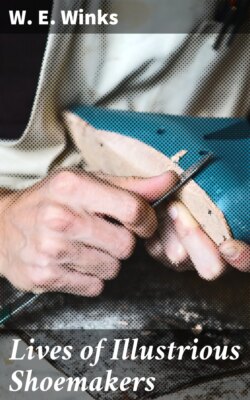Читать книгу Lives of Illustrious Shoemakers - W. E. Winks - Страница 7
На сайте Литреса книга снята с продажи.
JAMES LACKINGTON.
ОглавлениеTable of Contents
One of the most successful booksellers of the last century was James Lackington, whose enormous place of business at the corner of Finsbury Square, London, was styled somewhat grandiloquently “The Temple of the Muses.” A flag floated proudly over the top of the building, and above the principal doorway stood the announcement, no less true than sensational, “The Cheapest Bookshop in the World.” Lackington was an innovator in the trade, and had introduced methods and principles of doing business which at first awaked the ire of the bookselling fraternity, but were at length generally adopted, thus inaugurating a new era in the history of this important business. His name cannot be omitted from any complete history of booksellers, and it is none the less deserving of a place in the category of illustrious shoemakers; for Lackington commenced life as a shoemaker, and for some time after he had entered on bookselling speculations continued to work at the humble trade to which he had served an apprenticeship.
When Lackington was about forty-five years of age, and had made a considerable fortune in the bookselling trade, he wrote and published a singular book, in which he narrated the principal events in his life, under the form of “Letters to a Friend.” This book bears the title “Memoirs and Confessions,” and is certainly one of the most remarkable autobiographies ever presented to the world. What portion of its contents may be referred to by the term “memoirs” as distinguished from “confessions” it is impossible to say, but certain it is that there are many things in the book which its author would have done well to blot as soon as they were written, and of which he was no doubt heartily sorry and ashamed in after-life. Among the worst of these were his strictures and reflections on the Wesleyan Methodists, to whom he had belonged in early life, and from whom he had received no small benefit, temporal as well as spiritual. When the second edition of his memoirs came to be printed in 1803, his character had undergone a happy change. He then saw things in a different light, and made full and complete acknowledgment of the faults which marked the first edition; expressed in very decided albeit very conventional terms his faith in Christian truth, and his debt of obligation to the religious people whom he had so sadly maligned. But words were not enough to satisfy his ardent, thorough-going nature. His benefactions to the Wesleyan Society were very considerable, and he seemed toward the close of his life to have found great satisfaction in making the best use of the ample means at his disposal. With all his faults he was an estimable man, honest, truthful, and generous. He was never ashamed of his lowly birth and humble apprenticeship, nor turned his back on his poor relations, but ever sought them out and helped them when he had the power to do so. His success in business was owing to his shrewd common-sense, his rare insight into character, his good judgment as to the public taste and requirements, his capital method of assorting and classifying his stock and strict keeping of accounts, his courageous yet prudent purchases, and his strict adherence to a few sound maxims of economy and thrift. None but a man of original and uncommon powers of mind could have launched out on new speculations and adventures as Lackington did with the same uniform and certain success, and none but a man of good sense and lofty feeling would have been proof against the ill effects which so often attend on success. There is a touch of vanity in his memoirs, it is true, but it is not the vanity of a man who is vain and does not know it; he is quite conscious of his egotism, and indulges in it with thorough good-humor as a hearty joke. He was rather fond of display, kept a town-house and a country-house when he could afford it, and set up a “chariot,” as the phrase went in those days, and liveried servants. Yet it was not many men in his position who would have taken for a motto to be painted on the doors of his carriage the plain English words which express the principle on which his business had been made to bear such wonderful results. “But,” he remarks, “as the first king of Bohemia kept his country shoes by him to remind him from whence he was taken, I have put a motto on the doors of my carriage constantly to remind me to what I am indebted for my prosperity, viz.,
